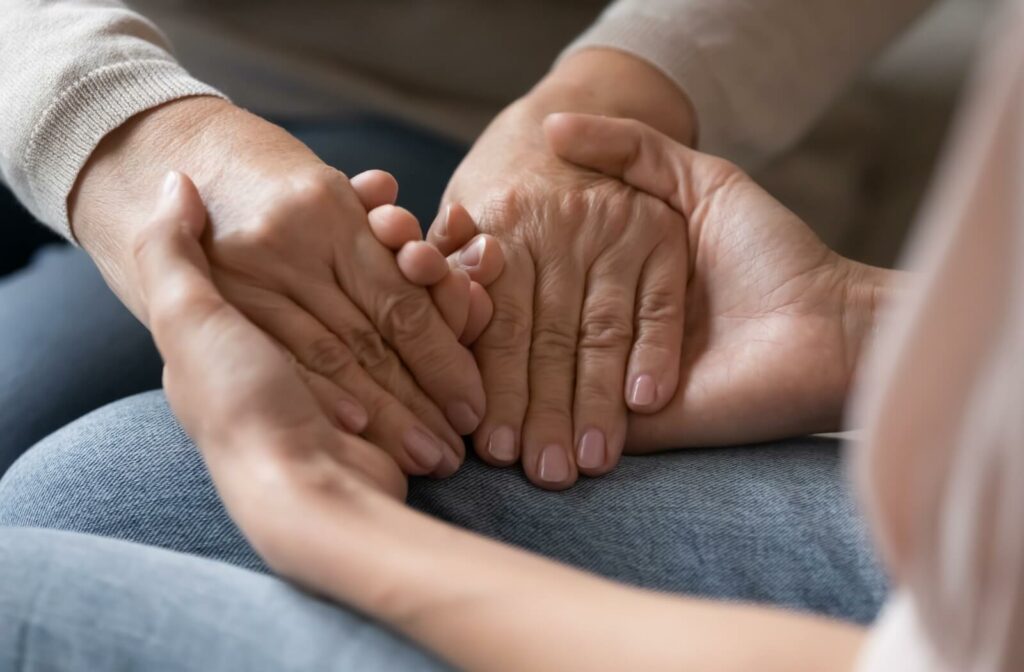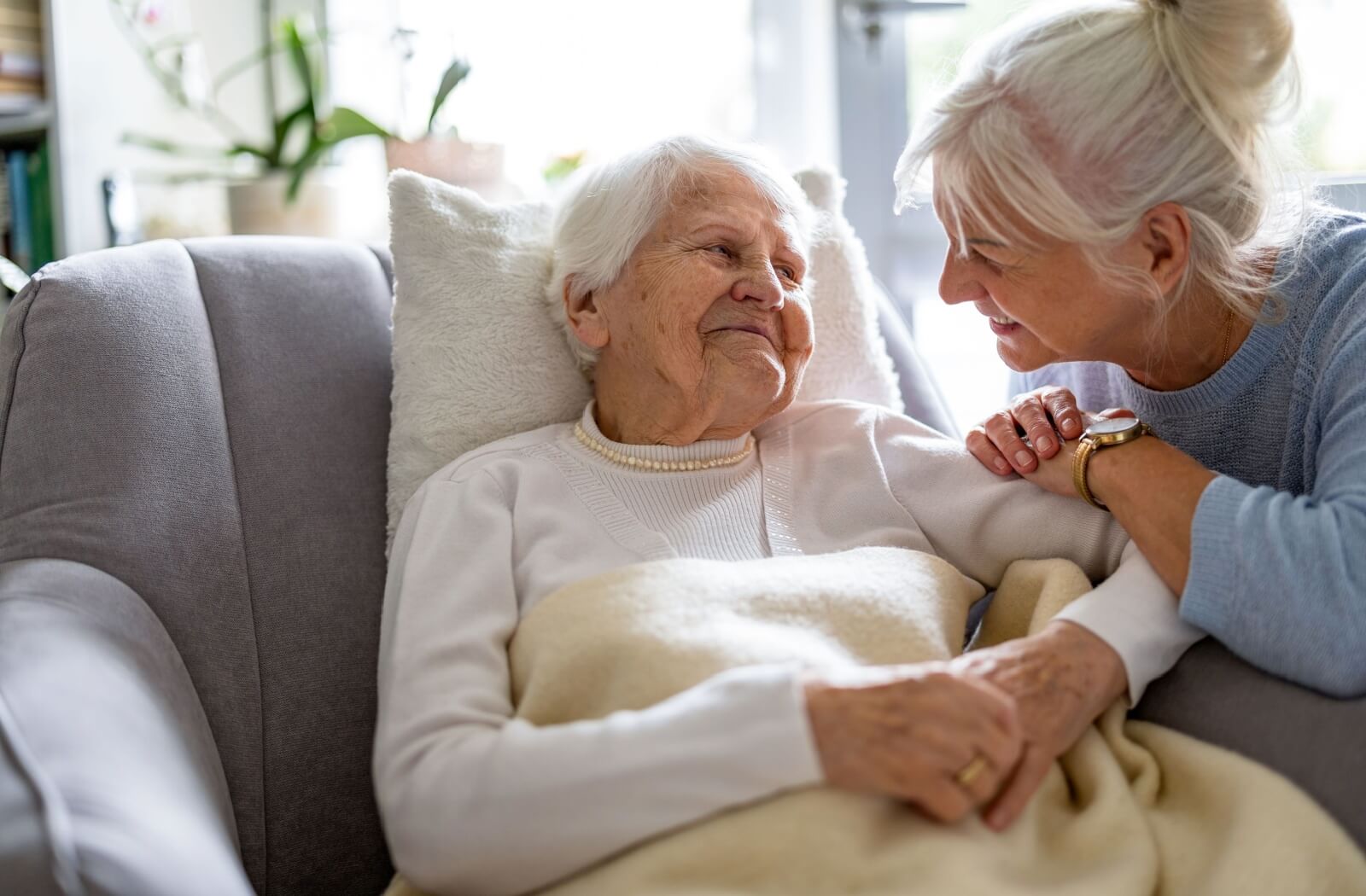Dementia sometimes creates new challenges. It affects memory, thinking, and behavior. However, it’s easy to forget that these symptoms can affect someone’s ability to stay independent. So, can you leave a parent with dementia alone?
There’s no universal answer, but there are clear patterns and signs to guide your choices. If your loved one is in the earliest stages of their condition, they can likely stay alone for short periods of time. If their symptoms put their daily safety at risk, they shouldn’t be left alone.
Fortunately, you have options. Through professional support like memory care, you can help your parent stay safe while respecting their autonomy in their everyday life.
How Dementia Affects Everyday Safety
Dementia impacts more than memory. It can affect movement, reaction time, and decision-making, all of which change how someone interacts with their surroundings. That’s why everyday safety is a major concern when caring for someone with dementia.
Dementia can cause:
- Memory loss that causes disorientation in familiar spaces
- Confusion with time, place, or people
- Impaired judgment around cooking, driving, or medications
- Mood or personality changes that increase unpredictability
- Difficulty with balance, coordination, or motor skills
- Wandering or becoming lost in familiar places
These can quickly put your loved one at risk, even in their own home. These may become worse depending on your loved one’s current stage of dementia.
The Effects of the Different Stages of Dementia
Dementia isn’t one-size-fits-all. Your loved one’s needs will shift depending on their current stage. Some people move through these phases slowly, while others progress more quickly.
Early-Stage Dementia
In the beginning, dementia might look like small memory slips—missing appointments or misplacing objects. Most people still maintain their independence, but there’s a growing reliance on reminders and support systems.
Safety risks at this stage are usually related to forgetfulness or early confusion.
At this stage, your parent can likely stay home alone. However, as their condition progresses, regular checkups with healthcare providers are key to keeping them safe.
Intermediate-Stage Dementia
The middle stage often brings more noticeable personality changes, emotional distress, and confusion.
Daily tasks like cooking, dressing, or taking medications become challenging, and the risk of wandering increases. Verbal outbursts or fear responses may also surface, even in familiar environments.
At this point, the risks of staying alone tend to rise. Leaving someone alone could mean missed medications, accidents or falls, and wandering out the front door. Identifying these disorienting behaviors is often why people begin considering a potential move to memory care.
Late-Stage Dementia
Late-stage dementia affects both cognitive and physical abilities. Your loved one may become non-verbal, immobile, or unable to recognize familiar faces. They’ll likely need full-time help with eating, hygiene, and mobility.
At this point, professional care is essential. It’s more than having a helper nearby—it’s compassionate companionship from people professionally trained to manage the unique challenges of dementia. It helps your loved one preserve their dignity and quality of life.
The Risks of Leaving Someone with Dementia Alone
Leaving a loved one with dementia unsupervised—especially during middle or late stages—can significantly impact their safety and well-being. Even with a phone nearby or instructions on the fridge, memory loss and poor judgment can turn small situations into emergencies.
Dementia can lead to:
- Wandering out of the house or into unsafe areas
- Misusing appliances like ovens or space heaters
- Forgetting to take—or doubling up on—medications
- Slipping and falling in bathrooms or stairways
- Responding aggressively or fearfully to unexpected noises or visitors
There are many reasons your loved one might want to live alone or age in place. But the emotional, physical, and wellness benefits of professional care can empower their independence without jeopardizing their safety.

Tips for Supporting a Loved One with Dementia
No matter what stage of dementia is at play, the right environment makes a difference. With a personalized approach, you can help your loved one stay safe in their daily life.
Set a Consistent Daily Routine
A predictable routine can help reduce stress and confusion. Focus on creating a schedule that includes:
- Regular wake-up and bedtimes to establish a sense of stability
- Scheduled meals and activities to provide structure throughout the day
- Familiar tasks or hobbies that bring comfort and engagement
A simple structure can help reduce anxiety and boost confidence for both of you.
Make the Home Environment Safer
The right setup can make a big impact. Think of home adjustments as a flexible support system that evolves with your loved one’s needs.
It helps to:
- Use motion lights in hallways and bathrooms
- Remove rugs and cords that could cause falls
- Add locks or alarms to exterior doors
- Keep cleaning products, knives, and medications out of reach
- Install grab bars and shower chairs where needed
Even small changes can make their space safer and easier to navigate.
Communicate with Clarity & Patience
Effective communication isn’t just about what you say. It’s how you say it. Soft tones, eye contact, and a slow pace go a long way. If your parent seems upset or confused, don’t correct them.
Give simple choices instead of open-ended questions. For example, “Would you like coffee or tea?” feels much easier to process than “What do you want to drink?” And if your loved one struggles to find words, your calm presence may be more helpful than any response.
Is It Time to Think About Professional Care?
You don’t have to navigate this journey alone. Dementia can be complicated, but the right support makes a big difference here. With some small changes and professional help, you can rest easier knowing your loved one is safe in their everyday life.
At Juniper Village of South Hills, we’re ready to work together to create the personalized support your loved one needs. With our team at your family’s side, your loved one can enjoy all the benefits of community life.
Structure, support, and peace of mind await, so schedule a visit with us today!







